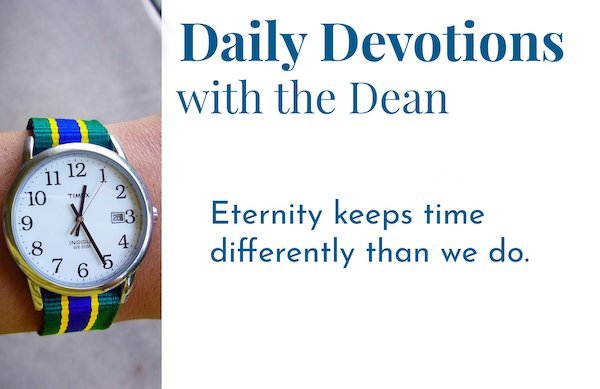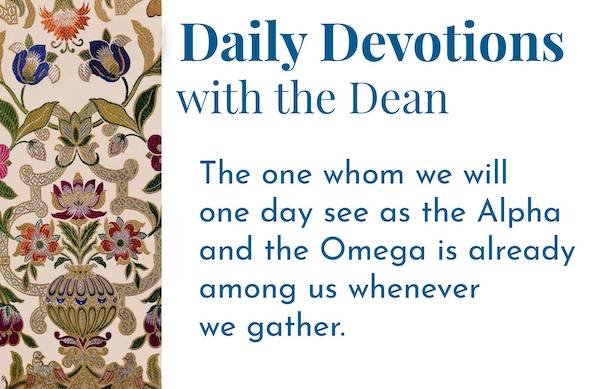Thursday • 12/7/2023 •
Thursday of the First Week of Advent
This morning’s Scriptures are: Psalm 18; Amos 4:6–13; 2 Peter 3:11–18; Matthew 21:33–46
This morning’s Canticles are: following the OT reading, Canticle 8 (“The Song of Moses,” Exodus 15, BCP, p. 85); following the Epistle reading, Canticle 19 (“The Song of the Redeemed,” Revelation 15:3–4, BCP, p. 94)
Welcome to Daily Office Devotions, where every Monday through Friday we consider some aspect of that day’s Scripture readings, as given in the Book of Common Prayer. I’m Reggie Kidd, and I’m grateful to be with you on this Thursday of the First Week of Advent. Happy New Year! Our readings find us in Year 2 of the Daily Office Lectionary.
Amos: what sort of God? Who would have expected a lowly shepherd and farmer to offer up one of the most exalted and elegant descriptions of God in all the Bible? “For lo, the one who forms the mountains, creates the wind, reveals his thoughts to mortals, makes the morning darkness, and treads on the heights of the earth—the Lord, the God of hosts, is his name!” (Amos 4:13).
Transcendent thoughts!! Stop-you-in-your-tracks thoughts! And to think that at Advent we prepare to welcome this exalted God as one who lowers himself to be born in a manger to form a new people, to reveal his very person to mortals, to turn sin’s darkness to light, and to raise us to the heights of heaven! Amazing stuff!
Image: "Distant Horizons" by Robert Hruzek is licensed under CC BY-NC-ND 2.0
2 Peter: What sort of people? In historic Christianity, believers have (unlike the “scoffers” of yesterday’s paragraph in 2 Peter) kept a vigilant eye on the distant horizon. We have done so all the better to give ourselves to living fully and well right here and right now. We do so in response to Peter’s probing questions: “Since all these things are to be dissolved in this way, what sort of persons ought you to be in leading lives of holiness and godliness?” (2 Peter 3:11).
What sort of persons, indeed, are preparing themselves to fit into the garb of resurrection bodies, to be able to breathe the atmosphere of new heavens and new earth, and to feel at home rather than unhappy and out of place there? (Consider that sentence an invitation to read, or to reread, C. S. Lewis’s, The Great Divorce.)
2 Peter: Hastening the coming… “…waiting for and hastening (Gk: speudein) the coming of the day of God” (2 Peter 3:12). Now there’s an intriguing thought! Can I make the Lord come back faster by the way I live? Peter has just indicated that God’s desire that “all should be saved” is the reason for the “elongation” of history. It’s God’s patience that is holding back the Parousia (Christ’s return) and the consummation of all things. The Lord kindly and patiently waits, allowing the spread of the gospel to work repentance and faith within rebellious human hearts. Peter thinks a corollary is true as well. It would seem that Peter offers a Christian version of the 2nd century Jewish teacher Rabbi Eliezer’s teaching that Israel’s repentance would hasten the coming of redemption.*
It’s not at all as though the Father’s sovereign will is diminished or that the mystery of the Son’s not knowing his day and hour is erased (Mark 13:32; Matthew 24:36). Rather, it’s a matter of perspective. I offer my own paraphrase of Peter’s thought: “If we are eager for the Lord’s return and for the establishment of final righteousness on a new earth under new heavens, then we should live as though we wanted it sooner rather than later! We should inhabit the peaceability of the Kingdom that is coming.” More amazing stuff!
2 Peter: As our dear brother Paul wrote… Peter’s brief comment about Paul is fraught with meaning. The reference is simple and affectionate, suggestive of how early 2 Peter is (since 2nd and 3rd century references to apostles by contrast are elaborate and over-the-top) and of how kindly Peter regarded Paul.
After the row between them in Syrian Antioch that Paul recalls in Galatians 2, one might have expected tension between them. But such does not appear to have been the case. Peter supports Paul’s Gentile mission in Acts 15, and 1 Peter is replete with Pauline expressions and evidence of Paul’s influence on Peter’s theology.**
Not incidentally, while acknowledging that Paul’s letters make for a challenging read, Peter elevates them (and he is the first to do so) to the same level of authority as “the other Scriptures” (2 Peter 3:16d)! In 2 Peter, the “fisher of men” has left us a gem of a letter. How impoverished we would be without it!
Be blessed this day,
Reggie Kidd+
*In Richard Bauckham, Jude, 2 Peter, Word Biblical Commentary 50 (Word Books, 1983), p. 325).
**Like Paul, Peter uses the phrase “in Christ” as virtually an adjective for “Christian” (1 Peter 3:16; see Romans 8:1; 2 Corinthians 5:17); like Paul, Peter uses the term “charismata” to refer to spiritual gifts (1 Peter 4:10–12; Romans 12:6; 1 Corinthians 12); like Paul, Peter refers to God building a house for his dwelling where we offer spiritual sacrifices (1 Peter 2:4–10; Romans 12:1–2; Ephesians 2:11–22); Peter’s affirmation of Christ’s substitutionary atonement looks like a crisp summary of Paul’s more extended treatment (1 Peter 3:18; Romans 3:21–26; 5:6–11).













